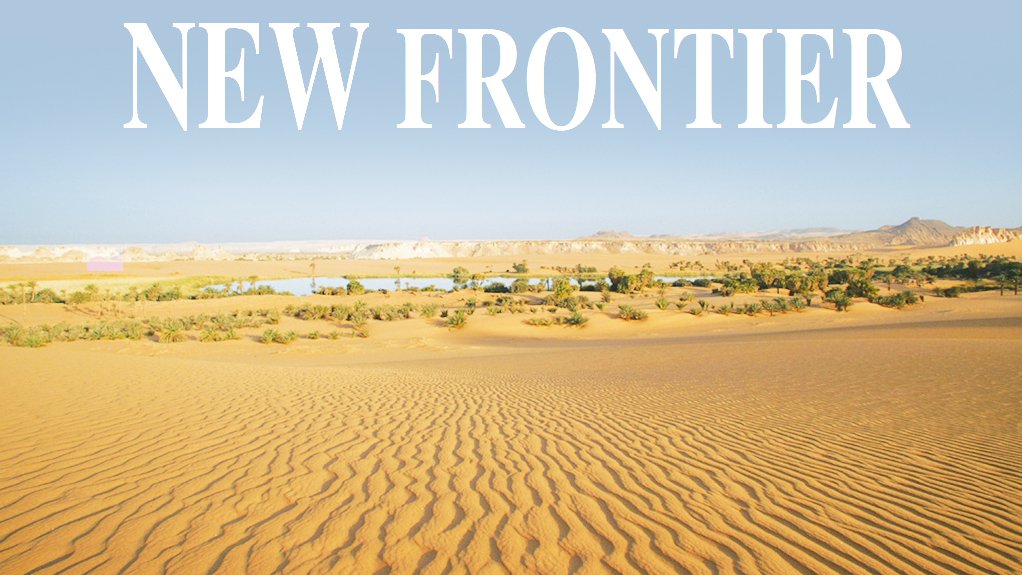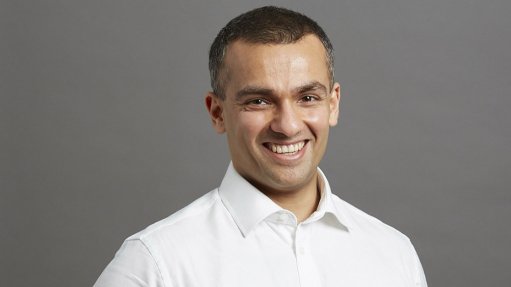SA-based company partners with Chad to develop country’s nascent minerals sector
Gold mining, refining and resources development company Quaestec Gold Africa Resources has partnered with the government of Chad to develop the Central African country’s nascent mineral resources sector, says company CEO Charles Fourie.
Chad’s gold deposits occur over 1 200 km, from the south to the north-west, and are located on the border of the Central African shear zone, with the gold located in ultra- narrow sequences occurring in original volcanic intrusive, metamorphic and sedimentary gold forms within several hundred kilometres of one another, Fourie explains.
“This type of geology represents substantial opportunities for mining companies and for companies seeking to provide equipment and services to the mining industry.”
Quaestec is a South Africa-based company that is also registered in the United Arab Emirates emirate of Dubai. The company’s 60:40 joint venture (JV) with the Chadian government (in favour of Quaestec), Société Nationale de Développement de Minérale (Sonadem), aims to unlock Chad’s diversified mineral resources potential, such as gold, silver, uranium, tin and tungsten.
The JV’s mandate is to formalise Chad’s geological information systems and resource data, develop the country’s mineral resources and establish a national gold refinery in the capital city of N’Djamena.
As Chad is a landlocked country that lacks railway lines, it is not possible to unlock its bulk commodities potential, Fourie says. “We, therefore, have . . . had to concentrate our efforts on high-value minerals such as gold, which is significantly easier to transport.”
Sonadem has employed a legal adviser and senior business manager with a “deep understanding” of Africa’s mineral resources sector, Marcell Oberholzer, to assist the government of Chad in streamlining its minerals legislation.
Fourie comments that this will ensure that Chad’s mining legislation is in line with best practices worldwide, its mining code is business friendly, its people benefit from the resources and mining and mining- related activities are undertaken in an environmentally responsible manner.
Currently, there are several thousand artisanal miners and 40 small-scale mining operations in Chad. Therefore, Fourie believes that it is of “critical importance” that the artisanal mining sector becomes formalised to ensure that there is no conflict with companies that want to establish large-scale operations.
This will ensure not only that mining houses will be comfortable with undertaking exploration work and develop mines without the fear of having to deal with illegal mining on their properties but also that artisanal miners can continue earning a living in a regulated and safe work environment, he explains.
Further, Sonadem is establishing trading areas, or buying tables, to ensure State control over the buying and selling of gold, thereby preventing the illicit and undocumented transfer of gold out of the country. All mineworkers, gold buyers and sellers have to register with the Chad Mining Ministry and present a Ministry-certified card to participate in the gold sector. This was instituted in January 2016 and has played an important part in preventing minors and illegal miners from working in Chadian mines and reduced the buying and selling of illegal gold, says Fourie.
He also points out that Quaestec has established a business relationship with Qatar-based investment group Al Delaimi Holdings, which will provide working capital for Sonadem and finance the construction of the gold refinery in Chad. “Al Delaimi Holdings has invested several million dollars in these initiatives; however, we cannot release the exact figure, owing to contractual privacy obligations,” states Fourie.
He highlights that Sonadem has a small, temporary refining facility, but that the permanent refinery is under construction and expected to come into operation by the end of April. The refinery will initially have capacity to process 500 kg of gold a month and will be ramped up to accommodate up to 1.2 t of gold a month by the end of 2017.
Fourie points out that Chad’s gold miners sell about 250 kg of gold a month. However, he stresses that this is likely to be much higher in reality, as significant amounts of gold continue to be traded illegally, despite government’s efforts to clamp down on such illicit transactions.
Further, Sonadem geotechnical director Johan Verkes is heading up the company’s field exploration team to provide a better understanding of the geology of the country and map out its mineral deposits.
Sonadem has also appointed geologist Charles Miller to guide and audit the company’s geological mapping processes. Advisory firm PwC is auditing Sonadem to ensure that all financial dealings of the company are in line with international best practices, while, Fourie adds, pan-African banking conglome- rate Ecobank has also expressed support for Sonadem’s efforts to unlock the country’s mineral resources potential.
Sonadem has allocated a number of exploration blocks to several mining companies, such as Aim-listed IronRidge Resources, to undertake exploration activities.
Mining Weekly reported in August 2016 that IronRidge had secured a “first-mover advantage” over a potential major new gold discovery in Chad, after having entered into a conditional share subscription agreement with private Singapore-registered company Tekton Minerals.
The Africa- and Australia-focused mineral exploration company stated at the time that it would invest up to $3.5-million to acquire up to 58% of the shareholding in Tekton and, subsequently, obtain access to exclusive rights over five exploration permits covering 1 000 km2 and reconnaissance licences covering 400 km2 in Ouaddaï province.
The underexplored, yet highly prospective territory within the Saharan Metacraton of Central Africa boasts gold-mineralised, province-scale geological structures, comparable with those of the gold-rich Birimian greenstone belts in Ghana, Senegal, Mali, Côte d’Ivoire and Burkina Faso.
“Chad represents a highly prospective, underexplored destination for minerals with obvious gold endowment, largely forgotten, owing to the focus on oil, with an attractive mining code and investment framework where major oil companies have been operating for decades,” said IronRidge CEO Vincent Mascolo last year.
Tekton, which has extensive in-country exploration, logistics and government relations expertise, along with a proven record in geological target generation and development, had undertaken comprehensive exploration work in the region over the past two years, he explained.
Tektron notes that geological mapping, soil, rock-chip, trenching and channel sampling, ground magnetic and resistivity surveys, high-resolution digital terrain modelling and aerial photography using drone technology, as well as mineralogical studies, indicate the potential for several multimillion-ounce gold discoveries in Ouaddaï alone.
Tekton has mostly focused on its Dorothe, Echbara and Am Ouchar licences, where multiple high-priority gold targets have been defined, including one drill-ready target at Dorothe and additional untested lithium, graphite, base metal and uranium targets within the licence portfolio.
Trenching and channel sampling across Dorothe unveiled 14.12 g/t of gold over 4 m, 34.1 g/t over 2 m and 63.2 g/t over 1 m along a 1 km strike, with additional extensions up to 3 km along strike. A 3 km × 1 km gold mineralised area was also defined for follow-up after further artisanal hard-rock workings.
Trenching results at Am Ouchar, a 200 km2 area 70 km south‐east of the Dorothe licence, include intersections of 20 m at 6.8 g/t of gold, 16 m at 4.7 g/t and 12 m at 5.7 g/t, with individual 2 m composite grades up to 33 g/t of gold.
Follow-up channel sampling by Tekton returned intersections including 2 m at 18.2 g/t of gold, 2 m at 14.2 g/t and 2.3 m at 9.9 g/t. Within the 200 km2 Echbara licence area, about 25 km west of Dorothe, follow- up trenching by Tekton revealed 56 m at 0.61 g/t of gold, including 10 m at 0.9 g/t, 20 m at 0.87 g/t and 25 m at 0.8 g/t.
Further, two highly prospective reconnaissance licences have been awarded in the same province over the targets Adé, 40 km east of Dorothe, and Nabagay, 25 km north of Dorothe, collectively covering 400 km2. Further, two exploration licences have been granted at Waya Waya, covering 400 km2, in the northern Ouaddaï region, 260 km north of the Dorothe project area.
Other mining companies with developing mineral resource projects in Chad include Canadian mineral resources development company Meridex, diversified mining and marketing company Glencore and South Korea-registered gold mining company Afko.
Fourie says Sonadem has been “inundated” with enquiries from South African, Canadian, European, Chinese, Australian and Russian mining companies about attaining prospecting permits in Chad.
He attributes the heightened interest partly to the improved political, security and social situation in the country since its recent Presidential election. In April 2016, President Idriss Déby was re-elected for a fifth five-year term.
Transnational nonprofit, nongovernmental organisation International Crisis Group (ICG) notes that, until recently, Chad was considered a poor country, lacking in influence and facing the constant threat of rebellions. However, it says this has changed since it became an oil producer and a regional military power.
“By deploying its soldiers on multiple fronts – including in a heavily criticised intervention in the Central African Republic, as well as in Mali and, more recently, in the Lake Chad basin – all to fight militant group Boko Haram, the regime is pursuing a strategy of military diplomacy, hoping to lead the fight against terrorism in the region.
“In so doing, Chad has consolidated its alliances – founded on fighting a common enemy – with Western countries,” the ICG states, adding, however, that some Chadians view this as an insurance policy for a regime that lacks legitimacy.
Comments
Press Office
Announcements
What's On
Subscribe to improve your user experience...
Option 1 (equivalent of R125 a month):
Receive a weekly copy of Creamer Media's Engineering News & Mining Weekly magazine
(print copy for those in South Africa and e-magazine for those outside of South Africa)
Receive daily email newsletters
Access to full search results
Access archive of magazine back copies
Access to Projects in Progress
Access to ONE Research Report of your choice in PDF format
Option 2 (equivalent of R375 a month):
All benefits from Option 1
PLUS
Access to Creamer Media's Research Channel Africa for ALL Research Reports, in PDF format, on various industrial and mining sectors
including Electricity; Water; Energy Transition; Hydrogen; Roads, Rail and Ports; Coal; Gold; Platinum; Battery Metals; etc.
Already a subscriber?
Forgotten your password?
Receive weekly copy of Creamer Media's Engineering News & Mining Weekly magazine (print copy for those in South Africa and e-magazine for those outside of South Africa)
➕
Recieve daily email newsletters
➕
Access to full search results
➕
Access archive of magazine back copies
➕
Access to Projects in Progress
➕
Access to ONE Research Report of your choice in PDF format
RESEARCH CHANNEL AFRICA
R4500 (equivalent of R375 a month)
SUBSCRIBEAll benefits from Option 1
➕
Access to Creamer Media's Research Channel Africa for ALL Research Reports on various industrial and mining sectors, in PDF format, including on:
Electricity
➕
Water
➕
Energy Transition
➕
Hydrogen
➕
Roads, Rail and Ports
➕
Coal
➕
Gold
➕
Platinum
➕
Battery Metals
➕
etc.
Receive all benefits from Option 1 or Option 2 delivered to numerous people at your company
➕
Multiple User names and Passwords for simultaneous log-ins
➕
Intranet integration access to all in your organisation




















